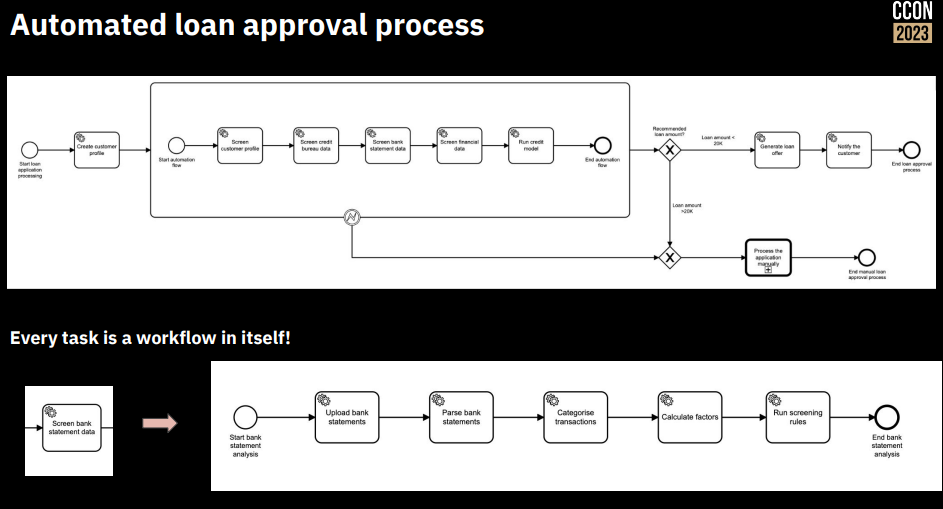Improving customer experiences and communities, one loan at a time
Funding Societies was founded in 2015 to help small and medium enterprises (SMEs) in Southeast Asia get the short-term capital they need to grow. Through their digital lending platform, they’ve already dispersed more than $3.2 billion U.S. dollars in business financing to nearly 100,000 SMEs and continue to work for greater inclusion of underserved business owners within financial systems. According to Senior Engineering Manager, Rajesh Kumar Dharmalingam, customer experience isn’t just a buzzword anymore, it’s a game-changer.
”Speed matters in a financial industry. Being able to process transactions, offer loan services, offer investment services much faster than your competitors [can] attract customers and retain customers,” Rajesh told an audience at CamundaCon 2023. “Customers often prefer companies or institutions that meet their needs quickly and efficiently.”
But historically, lending decisions were not made quickly. Rapid decision-making can increase risk, and the lending process is subject to numerous regulatory steps and data checks, slowing efficiency. For an organization like Funding Societies, which services five Southeast Asian countries, the decision-making and underwriting process is even more complex, as each country has its own framework of rules and regulations. To manage that complexity and differentiate their business from their competitors, Funding Societies turned to Camunda. Using Camunda’s process orchestration capabilities, Funding Societies makes it possible for SMEs to apply online and receive a pre-approval decision within a matter of minutes.
Automating the whole process

Funding Societies’s loan application and approval process follows a familiar workflow that includes, among other tasks:
- onboarding customers and creating a customer profile;
- collecting and screening required documentation, including information that satisfies Know Your Customer (KYC) and anti-money laundering (AML) regulations;
- screening the customer profile;
- checking credit bureau data;
- reviewing bank statements;
- and calculating the quantum, tenure, and interest rate (QTI).
The business process model notation (BPMN) for the lending process is complex, with numerous business validations and process branches that support actions for role-based access, custom UI, third-party data connections, underwriting decision-making, exceptions, and manual work or review.
To streamline the process execution, Funding Societies builds each service task as a workflow and uses Camunda’s workflow engine to automate processes from end to end, including any exceptions or manual work. They use Camunda’s process orchestration capabilities to help speed up risk assessment, fraud verification, and debt capacity assessment processes as well.
“We were able to solve a lot of problems with the help of Camunda,” said Rajesh. By implementing Camunda as a microservice and using process orchestration to automate mission-critical processes, Funding Societies reduced approval time from days to minutes. By drastically reducing the loan review and approval time, they created superior customer experiences and a competitive advantage for the organization.
Managing complexity by simplifying
Reflecting on their journey, Rajesh’s advice to other organizations tackling complex automations is to keep it simple. “Each BPMN process has to be simple and contextual to the problem it is solving,” he said. “We should not be putting all these sub-workflows into the main workflows. That will make a task monolith, and that should be avoided.”
He also advised separating out business rules. Funding Societies, for example, built and implemented a custom rule engine in-house.
“Oftentimes, we end up complicating things with so many branches, even, and so many elements that we are obsessed with,” said Rajesh. “From the experience, I always feel that simple design is always better.”
Empowering businesses and improving societies
Funding Societies is passionate about improving financial inclusion in Singapore and Southeast Asia and recognizes the potential of workflow automation to transform how people access and experience financial services.
As Rajesh sees it, “Technology has breathed life into the world of banking. You can have the banking services at your fingertips, quite literally. With the access to a computer and smartphone, you can do almost anything—paying bills, transferring funds, and even applying for a loan without leaving the comfort of your home.” He added, “If you look closely, it’s not just convenience. It’s empowerment. Technology has made banking more inclusive. It has opened the door of financial services for those who were once excluded.”
Hear more from Rajesh about loan automation with Camunda
You can read more about Rajesh’s presentation and download his slides here, or watch below.


Start the discussion at forum.camunda.io